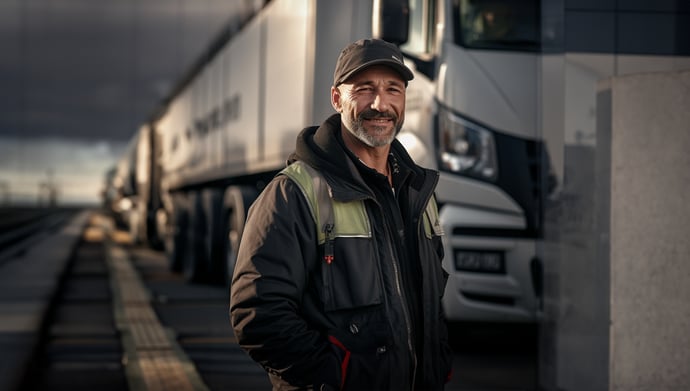Finished Cars and Their Logistics in Mexico
| Written by Mark Buzinkay

No video selected
Select a video type in the sidebar.
What do we know about the Automotive Industry in Mexico?
Mexico is a major player in global automotive manufacturing, with 26 automobile plants spread across the country. These plants belong to OEMs such as General Motors, Ford, Nissan, Stellantis, Volkswagen, Toyota, and BMW. Mexico produces over 4 million vehicles annually, with 91% dedicated to export markets.
Guanajuato is an automotive hub with plants from General Motors, Honda, Ford, Toyota, and Mazda. In 2022, Guanajuato alone produced over 725,000 vehicles, making it one of the top production states. Major production cities include Silao and Celaya.
Puebla is another significant centre, home to Volkswagen's largest assembly plant outside of Germany and an Audi plant. Over 85% of vehicles produced in Puebla are exported, mostly to the U.S., Germany, and Canada.
San Luis Potosí hosts plants for BMW and General Motors, with BMW focusing on producing its 3 Series models. GM's plant here is responsible for assembling the Chevrolet Aveo and Trax, contributing heavily to the region's automotive output.
In northern Nuevo León, Kia has a large assembly plant, while Tesla has announced plans for a gigafactory in Monterrey, further expanding the state's automotive output.
Lastly, Aguascalientes is a critical location for Nissan, which operates one of its largest plants in the country. Nissan produced nearly 800,000 vehicles in Mexico in 2022, making it one of the top producers in the country.
Finished Cars and the Importance of the Automotive Industry in Mexico
Mexico's growing role in the automotive industry has led to a surge in demand for finished vehicle logistics (FVL). With its strategic location near the US and Canada, strong rail networks, improving ports, and expanding EV and battery supply chains, the country has become a hub for OEMs and logistics firms. Vehicle production has rebounded to pre-pandemic levels, with over 3.3 million light vehicles exported in 2023—a 15.2% increase from the previous year. However, as demand rises, Mexico faces the challenge of balancing its logistics capacity.
Mexico's automotive sector is experiencing rapid growth, driven by both domestic and export markets. Major manufacturers like BMW, Volkswagen, and Tesla are expanding operations, prompting logistics firms to increase capacity to meet demand. BMW is building an 80,000 sq.m battery plant in San Luis Potosi, set to support its electric vehicle production by 2027, while Volkswagen is strengthening its North American supply chain. Despite some delays, Tesla plans to open a new gigafactory near Monterrey. At the same time, GM, Nissan, and VW continue exporting around 80% of their vehicles, while Chinese car brands have seen a 300% sales spike in Mexico, adding pressure on logistics networks.
Logistics firms are ramping up investment to handle this surge. Companies like Schneider National and Jack Cooper are expanding their presence in Mexico. Jack Cooper opened five new locations last year, and Grupo ATC's TLE Automotive is doubling its transporter fleet. This continued growth is essential as Mexico's FVL network strives to keep pace with rising demand.
Finished Cars and Port Infrastructure
Mexico's growing automotive exports have driven significant port investments to keep up with increasing demand. According to Jan von Feilitzen, commercial director at Transportes Marva, the shift of OEMs in the U.S. from conventional engines to EV production is pushing more vehicle production to Mexico, including electric vehicles. This has placed added pressure on suppliers and logistics infrastructure. While rail remains the primary export mode, short-sea services across Mexico's ports are becoming crucial for handling export volumes.
Recent port investments have been essential in preventing a critical capacity shortage. Ports on Mexico's west coast, such as Lázaro Cárdenas and Mazatlán, have expanded significantly, while Gulf coast ports like Altamira, Tuxpan, and Veracruz continue to play a key role in managing the growing export flow. These improvements have helped balance the country's supply and demand in finished vehicle logistics.
In 2022 and 2023, Mexican RoRo ports handling vehicle exports and imports saw notable growth in volume. The port of Veracruz remained the country's top automotive port, handling 793,000 vehicles in 2022, contributing to nearly half of all vehicles moved via Mexican ports. Lázaro Cárdenas, on the Pacific side, handled about 580,000 vehicles in 2022, reflecting a 39% annual increase.
Meanwhile, Mazatlán port handled over 75,000 vehicles in early 2024, largely driven by imports, and Altamira saw a significant share of automotive traffic, moving a substantial portion of the 581,593 vehicles managed by Gulf Coast ports in the same period. Tuxpan also experienced rapid growth, with an impressive 1,209.7% increase, reaching 22,199 units.
Finished Cars: Inland ports and processing centres
Inland ports and processing centres are gaining attention as a potential solution to alleviate congestion at Mexico's seaports. This idea is particularly well-suited for the country's automotive industry, as most manufacturing plants are located far from the coast. While Mexico has vast areas of undeveloped land, cities and infrastructure have largely grown around the coastline, making space near ports scarce and expensive. Building inland facilities could relieve pressure on coastal ports by relocating storage and processing activities inland. This model, where inland facilities act as marine terminals serviced by regular shuttle trains, allows for more efficient use of space (see also: Vehicle yard management). While this approach introduces an additional step in the logistics chain, the benefits outweigh the downsides, particularly when cars are stored and prepped closer to population centres, which is often more economically viable than doing so at the ports.
Currently, there are a few "off-dock" facilities in operation, notably around Veracruz, but these initiatives are still in the early stages. Experts predict that over the next few years, we could see more inland processing centres, although their primary purpose would likely be to bring vehicles closer to key markets, like Mexico City and northern regions, rather than being positioned near the ports themselves.
Interestingly, this contrasts with practices in many other regions, where vehicle processing typically happens at or near the port before trucks transport the finished cars to their destinations. Experts believe that for these inland processing centres to be viable, they will need to be shared among multiple OEMs. He notes an increasing willingness to collaborate in this way, observing that once one OEM finds a solution, others tend to follow suit. Sharing facilities could become a common practice, further streamlining operations and reducing costs
Finished cars security during their journey
In 2023, Mexico saw a rise in cargo theft, including incidents involving car trailers. There were approximately 13,000 reported incidents of truck theft, a 5% increase compared to the previous year. The majority of these thefts occurred in high-risk states such as the State of Mexico, Puebla, and Michoacán, where violence often accompanied the robberies. There are no specific statistics available on how many affected car trailers or theft from vehicle processing centres. However, theft across the automotive supply chain, including from processing centres, has been a significant concern for logistics companies operating in Mexico.
Security challenges have long affected Mexico's finished vehicle logistics (FVL) market, with issues such as theft and drug trafficking leading to the deployment of marine troops to oversee port operations. Cargo at borders and ports faces strict security checks and increasing wait times, while FVL road and rail transport remains vulnerable to theft. To address this, military-backed convoys now escort vehicles along high-risk routes.
Logistics companies like TLEA have implemented their own security measures, using technology and staff training to mitigate risks. Transportes Marva's Martínez acknowledges the persistence of this issue, stating that criminals have increasingly targeted car hauliers. Similarly, Vascor has taken steps to enhance safety, including fortified facilities, partnerships with local police, and convoy coordination with other FVL firms, often accompanied by the Guardia Nacional. Despite the challenges, Vascor continues to work closely with customers and authorities to safeguard vehicles and operations.
FAQ: Finished Car Logistics in Mexico
Why is Mexico a significant player in global finished car logistics?
Mexico has become a major hub for automotive production due to its proximity to key markets like the U.S. and Canada, strong rail networks, and developing port infrastructure. With 26 automotive plants, including major OEMs like General Motors, Ford, and Volkswagen, Mexico produces over 4 million vehicles annually. Approximately 91% of this output is exported, positioning Mexico as a critical link in global finished vehicle logistics (FVL). Its role is also expanding with growing EV and battery production.
What are the major logistics challenges faced by Mexico's finished vehicle sector?
The primary challenges in Mexico's FVL sector include capacity constraints at ports, the need for more inland processing centres, and security concerns. As demand for exports rises, ports like Veracruz and Lázaro Cárdenas are facing congestion, leading to discussions about building more inland ports. Security remains a significant issue, with frequent cargo thefts and delays due to stricter border checks. To combat these problems, logistics firms and authorities are implementing military-backed convoys and advanced security measures (see also: the vehicle processing center).
How are logistics companies in Mexico adapting to the surge in vehicle production?
Logistics companies are ramping up their operations to manage the increased production and export demands. Firms like Jack Cooper and Schneider National are expanding their presence with new facilities and larger fleets. Additionally, investments in inland processing centres, similar to models in the U.S., are being explored to ease port congestion. These facilities would allow vehicles to be processed and stored closer to population centres rather than at crowded ports, improving overall efficiency.
Takeaway: Finished Cars & Logistics in Mexico
Mexico's finished car logistics sector is growing rapidly, driven by its key role in global automotive production and exports. The country faces challenges like port congestion, security risks, and the need for more inland processing centres. However, with increased investment in port infrastructure and security measures, logistics companies are adapting to meet rising demand. As Mexico expands its electric vehicle production and strengthens its export networks, it continues to solidify its position as a crucial link in the global automotive supply chain.
Delve deeper into one of our core topics: Car logistics
Glossary
Automotive hub refers to a region or industrial cluster that serves as a key center for automobile manufacturing, innovation, and supply chain activities. These hubs host major automakers, suppliers, and research institutions, fostering technological advancements and economic growth. Examples include Detroit (USA), Stuttgart (Germany), and Chennai (India). Factors like infrastructure, skilled workforce, and government policies contribute to their success, making them crucial for the global automotive industry.
Sources:
(1) https://www.automotivelogistics.media/finished-vehicle-logistics/how-mexicos-fvl-market-is-balancing-capacity-and-demand/46102.article
(2) https://www.elnoticieroenlinea.com/intensifico-ssa-mexico-operacion-de-teus-y-autos-durante-el-2022/
(3) https://t21.us/altamira-and-mazatlan-ports-gain-share-in-car-movement/
(4) https://mexico-now.com/automotive-transit-through-lazaro-cardenas-port-grows-24-during-january/
(5) https://www.freightwaves.com/news/tractor-trailer-thefts-rise-23-in-mexico-last-year
(6) https://www.opportimes.com/the-26-automotive-plants-in-mexico/
(7) https://magazine.automotivepurchasingandsupplychain.com/magazine/issue35/mexican-ports.html
(8) Wells, P. (2015). The Automotive Industry and the Environment. Routledge.
Note: This article was updated on the 12th of March 2025

Author
Mark Buzinkay, Head of Marketing
Mark Buzinkay holds a PhD in Virtual Anthropology, a Master in Business Administration (Telecommunications Mgmt), a Master of Science in Information Management and a Master of Arts in History, Sociology and Philosophy. Mark spent most of his professional career developing and creating business ideas - from a marketing, organisational and process point of view. He is fascinated by the digital transformation of industries, especially manufacturing and logistics. Mark writes mainly about Industry 4.0, maritime logistics, process and change management, innovations onshore and offshore, and the digital transformation in general.





